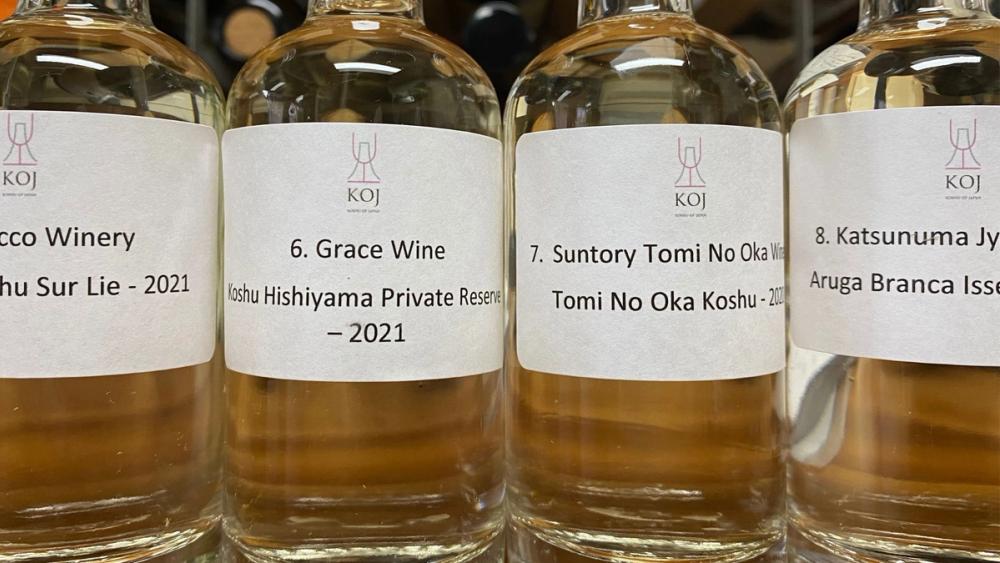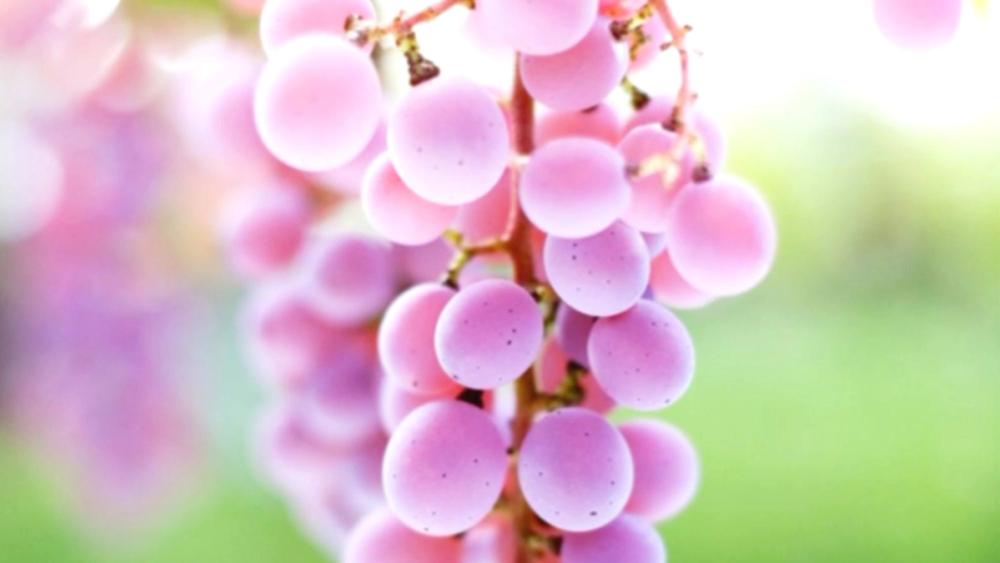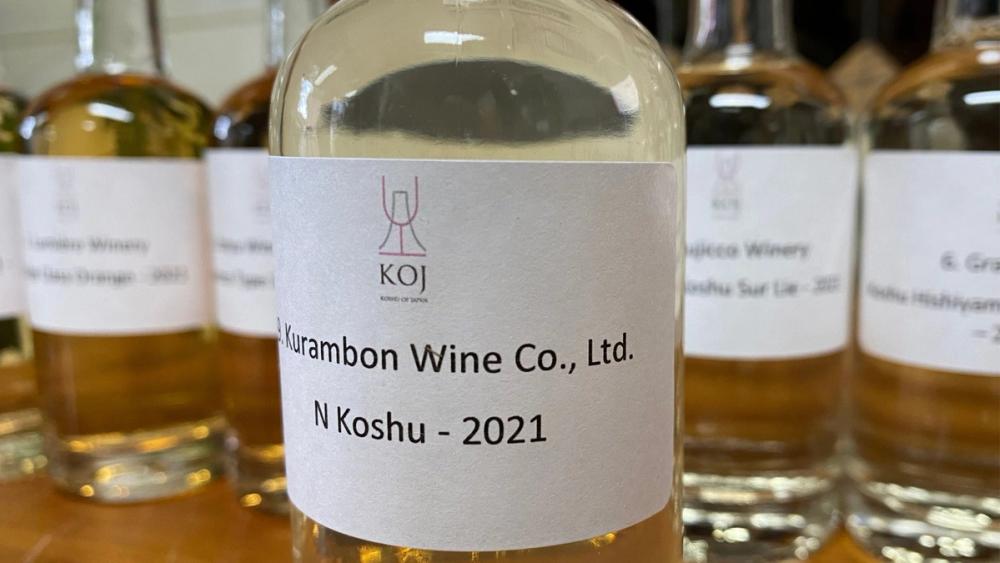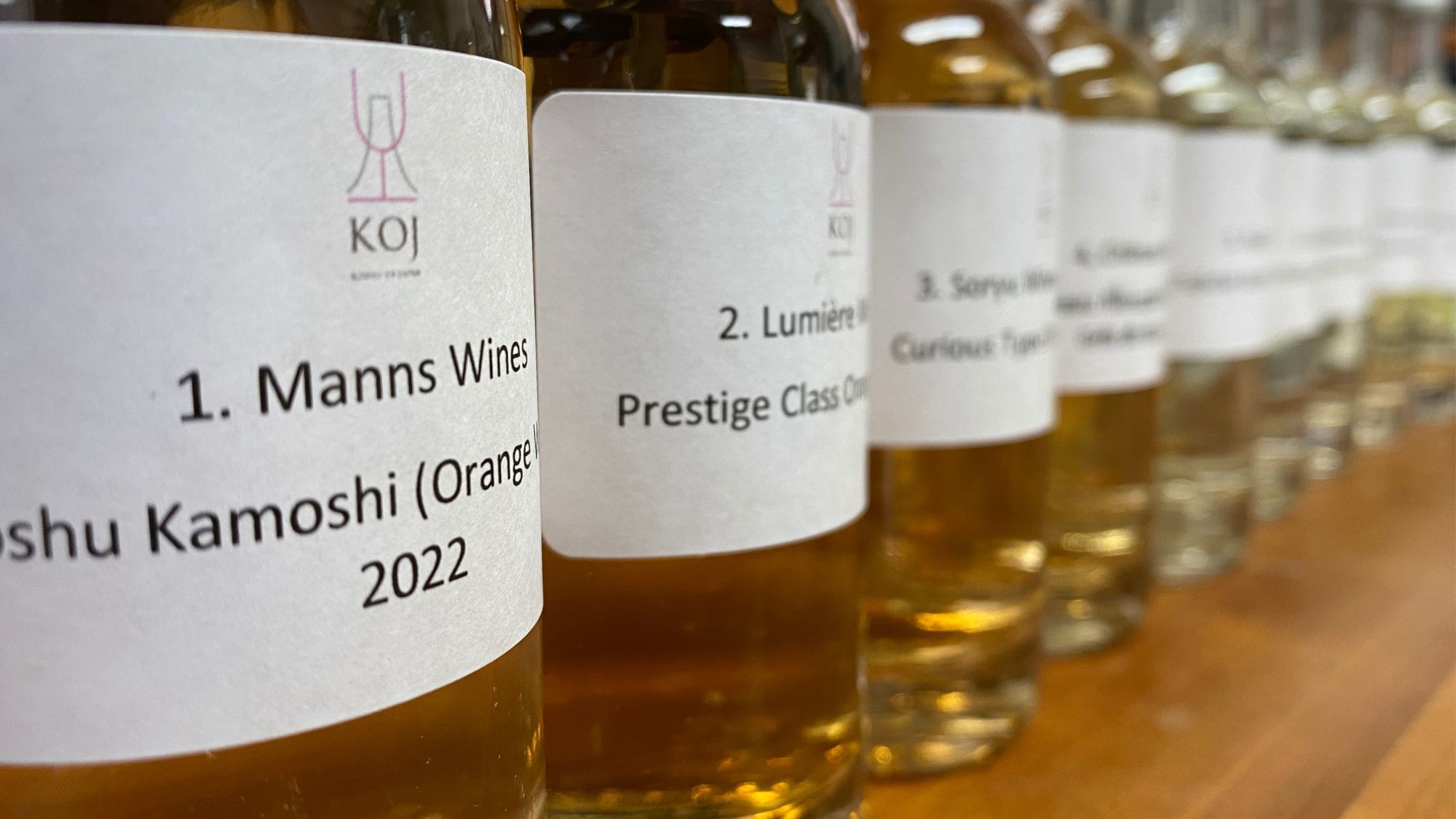“Koshu wine today has better fruit, concentration and intensity than ever before. The producers are brave enough to add layers with ambient yeast or lees ageing or skin contact, rather than just oak and they are expressing the terroir of the magical land where they’re grown.”

Koshu Wines of Japan tasting line-up, February 9, 2023
You can dread some morning online tastings. You get something big, fat and bold and you’re still tasting the toothpaste as you’re trying to write your notes? Not ideal. But they are still always more than worth it, especially when you get to hear from the winemaker before they hit the hay after their long day in the vineyards.
So when you get to see the winemakers and taste through a range of beautifully aromatic, delicate, yet supremely intense wines that can’t help but wake you up and put you in a great mood for the day? It’s really a lovely way to kick off any day. The recent Koshu of Japan tasting had me smiling all day.
I first came across Koshu as a wine grape about five or six years ago at a masterclass in London. I remember at the time thinking they were very pretty, but few really blew me away and nearly every wine in the tasting was looking for an importer. Not necessarily their fault, but it does make it slightly tricky to extol the virtues of putting some of these wines on people’s wine lists when you can’t get hold of them!
Fast forward to February 2023 and the picture is very different, in fact, this was my first experience of Koshu for a few vintages. The difference in both the quality and availability, and not least the choice of hosts in the enigmatic Poh Tiong Ch’ng and ever charming Dr Neil Beckett, made this a very enjoyable tasting to get to write up.
What you need to know about Koshu Wines of Japan

Koshu wine: the quality is there as are lower ABVs
The best Koshu wines are beautifully delicate, sitting towards the lower end of the alcohol scale and at the higher end of acidity scale. They’re also intense and full of flavour – something our hosts were quick to point out was far from a contradiction.
“Don’t confuse intensity with power,” warned Dr Beckett. “Some of the most intense pieces of music are performed pianissimo.” Not to be outdone on the cultural similes, Ch’ng added his own opinion that “Koshu is like painting with watercolours, not oil on canvas.”
Having played the drums as a kid and not owning a paint brush under four inches wide, I decided to take their word for it.
Another important distinction is that there is invariably a slight hint of tannin in most of the wines. Koshu grapes have pretty thick skins, which make them ideal as a disease-resistant variety in such a humid environment. No amount of careful cellar handling (and these producers are incredibly careful!) can stop a hint of skin contact having an effect. Far from being an issue, for me this only adds to the uniqueness of the variety, the terroir coming through into the glass, and the food-pairing options.
There are also increasing numbers of styles available. In our tasting of just nine wines, four were what we would consider to be ‘orange wines’, with the rest containing cloudy, unfined and unfiltered white wines and even some boasting ‘struck match’ reductive notes. As Dr Beckett pointed out, we didn’t even touch on the sparkling wines being made across the prefecture. The producers are experimenting, and the portfolios are expanding. The Koshu wines coming out of Japan are increasingly difficult, if not impossible, to pigeonhole.
What’s changed in recent years?
Koshu wines from Japan are clearly on the rise. Anyone who’s been lucky enough to attend the annual tastings in the last few years can attest to that. Dr Beckett referenced a conversation with Anthony Rose, author of the classic Wine Library book Sake and the Wines of Japan.
“Anthony started tasting these wines in 2012 and has often commentated on the huge improvement of wine quality,” recalled Dr Beckett. “It wasn’t too long ago that Koshu was better known as a table grape. The effort and energy and precision of the producers, as well as the use of external winemaking consultants like the late and great Paul Pontallier, has moved the standard of wines forward at pace.”
Subtle changes in the vineyards are having an effect too. Few wine regions in the world have to cope with the climatic issues faced by the winemakers of the Yamanashi Prefecture, expanding north of the famous Mount Fuji. There is a lot of rain, especially in monsoon season, yet also lots of intense sunshine. Viticulture is not easy. Pergola training systems are the norm, providing the hanging fruit protection from the humid ground. This does, however, produce notoriously high yields, which can dilute flavours.
“Yamanashi is warmer and wetter than you’d expect from a wine region,” explained Dr Beckett. “The better producers are moving towards the best vineyards, low yields and even experimenting with VSP trellising.”
With the changes in quality and style range, has come interest from importers. In our sample set of nine wines, only two didn’t have an importer of which one (Suntory’s single vineyard Tomi No Oka 2020) sounded like they just didn’t have the volumes to have any for our market. But across the rest of the wines, the likes of Amathus, Boutinot, and Hallgarten & Novum have all joined the Koshu party.
Why should you be putting Koshu Wines of Japan on your lists?
Well, first up and as I’ve already mentioned, the quality is there. Of the nine wines tasted, seven of them would grace any list and I’m being conservative about the two that missed out as they were probably just a tad too adventurous for the average drinker. But what they all had was that they were fun, they were different to the usual wines you see in the ‘light and fruity’ section’ and, let’s be honest, people buy a story like this. Wine from Japan? They’ll have a stab at it and then the quality will keep them coming back for more.
Lower alcohol wines are something the wine trade has just not quite got right, despite increasing attempts as consumers demand lower alcohol products. Naturally lower alcohol wines are gold dust and Koshu fits the bill. Across our tasting sample we were looking at wines from 10-12%, with most fermented to dry. These are great wines for lunchtime sippers or even those clients out dining on school nights.
It’s also worth seeing if you can get hold of some older vintages.
“The best Koshu can age for a decade or longer,” enthused Ch’ng. “They can be similar to the best Hunter Valley Semillons or Loire Valley Muscadets.”
I personally have never been lucky enough to try an aged example but, such was the passion in Ch’ng’s voice, I was convinced they must be good. Given the flavour and structure of some of the younger wines we tried, there’s no doubt some of them would go on to be something really special in a few years.
The future for Koshu of Japan
Writing in The World of Fine Wine, Andrew Jefford recently asked what tomorrow’s Koshu wines will be like?
“They’re already here,” beamed Ch’ng. “We’ve got better fruit and concentration and intensity than ever before. The producers are brave enough to add layers with ambient yeast or lees ageing or skin contact, rather than just oak. They are expressing the terroir of the magical land where they’re grown and the wonderful people who grow them.”
Ch’ng revealed that Chinese winemakers are taking a keen interest in the grape too. The historical circle would be poetic for a grape that is thought to have arrived in Japan, through China, along the Silk Road over a thousand years ago. Whatever its future outside the country, however, it’s clear that the stellar improvements year on year, and the joyous increase in availability, have made Koshu Wines of Japan an intriguing option for the buyers and sommeliers of the UK.
Top wines from the tasting

Kurambon Wine Co., N Koshu, 2021
Here’s our cloudy, native yeast, unfined and unfiltered friend. Not only that, but it’s seen some French oak fermentation as well, so the mix of flavours in the glass is a pretty interesting blend. Green and stone fruit and plenty of lemon, lime and lychee from the grape, a notable kick of vanilla from the wood, and a creamy mouthfeel from the lees texture. A brave wine, according to Ch’ng, as it’s not one for Koshu traditionalists. Definitely one for the funkier wine bars, and with the winemaker extolling the virtues of organic and biodynamic winemaking, we’re ticking a lot of boxes with this wine. Imported by Ueno Gourmet
Manns Wines, Koshu Kamoshi (Orange Wine) 2022
A slightly off-dry orange wine, but perfectly balanced. There’s not too much extraction going on allowing those delicate blossom, peach, lychee, lime and eucalyptus notes to play around in the glass. Taste-wise, the off dryness didn’t detract at all from the over-riding freshness, in fact it worked well with the slight tannic grip on the gums. Of all the orange wines we tasted, this was the one for me that you could have as a glass on its own, or with food. Ch’ng mentioned this is particularly fabulous with tempura dishes. Imported by JFC Ltd
Grace Wine, Koshu Hishiyama Private Reserve, 2021
Made from 100% pergola grown fruit and fermented and aged in only stainless steel, this wine in particular showed off the interplay between the intense lemon and lime citrus with the fresh saline note that persisted throughout. Add in the white peaches, pears, and apples and you’ve got everything there from fruit to savoury notes, texture to length, and very drinkable with or without food. A very pretty wine. Imported by Hallgarten & Novum Wines
For more information about Koshu of Japan, please contact the team at Phipps PR (KOJ@thisisphipps.com)
Mike Turner is a freelance writer, presenter, educator and regular contributor for The Buyer. He also runs wine events and an ecommerce business, Feel Good Grapes, that explores and discusses the idea of sustainability in the wine trade.






























